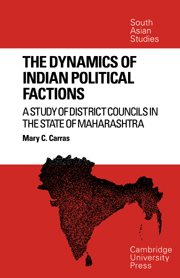Book contents
- Frontmatter
- Contents
- List of tables
- List of maps
- Acknowledgments
- 1 Introduction
- 2 The Argument
- 3 Political Integration: Empirical Conception and Method of Analysis
- 4 Ratnagiri District: Factional Alignments in Conditions of Poverty
- 5 Poona District: The Politics of Sugar
- 6 Aurangabad District: State versus District Leaders
- 7 Akola District: Factional Alignments in Conditions of Relative Plenty (The Politics of Cotton)
- 8 All Districts: Some Comparisons
- 9 Conclusion
- APPENDICES
- Notes
- Bibliography
- Index
7 - Akola District: Factional Alignments in Conditions of Relative Plenty (The Politics of Cotton)
Published online by Cambridge University Press: 23 November 2009
- Frontmatter
- Contents
- List of tables
- List of maps
- Acknowledgments
- 1 Introduction
- 2 The Argument
- 3 Political Integration: Empirical Conception and Method of Analysis
- 4 Ratnagiri District: Factional Alignments in Conditions of Poverty
- 5 Poona District: The Politics of Sugar
- 6 Aurangabad District: State versus District Leaders
- 7 Akola District: Factional Alignments in Conditions of Relative Plenty (The Politics of Cotton)
- 8 All Districts: Some Comparisons
- 9 Conclusion
- APPENDICES
- Notes
- Bibliography
- Index
Summary
THE POLITICAL AND ECONOMIC SETTING
The evidence examined thus far has consistently indicated that, under given conditions, there is a definite relationship between activity in cooperative institutions (which is usually associated with the cultivation of commercial crops) on the one hand, and the pattern of factional alignments on the other.
Akola provides us with a model example of a flourishing cash crop economy as a setting against which to study factional behavior. The entire Vidarbha area, wherein Akola is situated, is in one of the most important cotton tracts in the country. The economic importance of its principal product is considerable. The cotton textile industry is the single largest manufacturing industry in the country. Textiles also form the most important group of industries in the State of Maharashtra in terms of the productive capital contributed, the value of output and the value added by manufacture. Finally, raw cotton is the most important export item in the District of Akola and provides the raw material for one of the few large-scale industries in the district. Over 40% of the arable land here is under cotton and the proportion of the gross area under cultivation which is devoted to cotton in each taluka ranges from 31% to 55%.
- Type
- Chapter
- Information
- The Dynamics of Indian Political FactionsA Study of District Councils in the State of Maharashtra, pp. 129 - 160Publisher: Cambridge University PressPrint publication year: 1972



